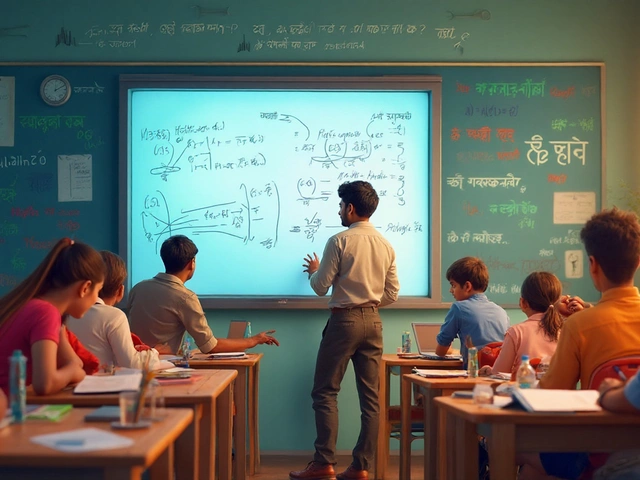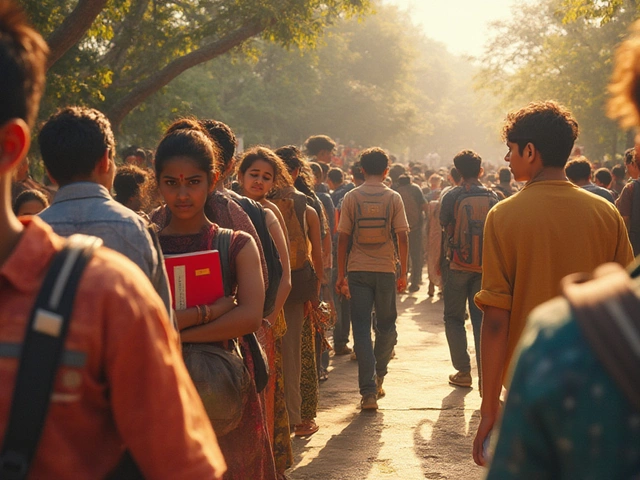
If you grew up with CBSE textbooks stacked on your desk, moving to the USA can feel like stepping into a different planet—especially when it comes to school records. Good news first: CBSE is recognized in the USA, but there are a few twists nobody tells you about on day one.
American high schools and colleges aren’t strangers to CBSE marksheets. Hundreds of Indian students apply every year, and admission officers have seen it all—printed marksheets, scanned PDFs, even the odd hand-written document from a school in a tiny Indian town. Universities usually treat CBSE as a solid academic background, but the details matter. Which classes did you take? Did your marks hit their GPA minimums? That’s where things can get tricky.
Before anything else, you’ll need to line up your transcripts. Schools don’t always accept original marks straight from India—sometimes you’ll have to get them evaluated by a service like WES or ECE. These companies basically translate your scores into an American-style transcript, which is as close as you’ll get to speaking their language on paper. Missing this step can easily get your application tossed aside.
And here’s a tip you rarely hear: Take your time to highlight math, science, and English courses on your transcript. American colleges care about these subjects more than the others. If you can, put together a short letter explaining the grading system—don’t assume they all know a 90 in CBSE isn’t the same as a 90 in the US system.
- How US Schools View CBSE Results
- Transcripts, Credits, and Application Process
- Admission Tips for CBSE Students
- Real Stories: Success and Surprises
How US Schools View CBSE Results
Most American schools and colleges recognize CBSE results, but don't expect a one-size-fits-all approach. The reputation of CBSE as India's national board is known, especially among universities that get a steady stream of Indian applicants. The big universities—think UCLA, NYU, or Georgia Tech—review hundreds of CBSE transcripts each year. Smaller colleges might see just a handful, but they're usually aware of CBSE’s academic standards.
Here's the thing: US schools don't convert CBSE marks directly into American grades. They know the grading is tougher in CBSE. Instead, they look for your class rank, your percentile, and the competition level at your school. They sometimes ask for “course descriptions,” especially for science and math, to compare what you learned with their classes. If your school offered tougher versions—like the CBSE “Science Stream”—that actually helps your case.
One practical example: Ivy League admissions consider a 90% in CBSE as very strong, often on par with a 3.7–4.0 GPA in the US, even though a US ‘A’ is 90% and up. Here’s a handy conversion comparison:
| CBSE Percentage | Approx. US GPA |
|---|---|
| 91–100% | 4.0 |
| 81–90% | 3.7–3.9 |
| 71–80% | 3.3–3.6 |
| 61–70% | 2.7–3.2 |
US education systems also value extracurriculars. If your CBSE school offered clubs, sports, or competitions, highlight these. American colleges love seeing all-rounders, not just toppers. Don't be shy about mentioning leadership roles—student council, sports captain, you name it.
Bottom line: CBSE is well-respected in the US, especially if you show where your marks fit in your class and spell out what your classes covered. The more you help admissions teams get the big picture, the better your odds.
Transcripts, Credits, and Application Process
The moment you start planning your move to the U.S., getting your CBSE transcripts in order should shoot to the top of your to-do list. Schools and colleges in the USA need to see an official record of your courses and grades, and they usually want it sent straight from your school or the CBSE board. Just bringing photocopies from home almost never works—trust me, plenty of students have had their applications put on hold for this reason.
This is where credential evaluation services come in. You might see names like WES (World Education Services) or ECE (Educational Credential Evaluators) pop up a lot. They basically translate your marks into the local grading system, usually the American GPA scale. Think of them as official translators who help colleges figure out if your 86 in Math measures up to a U.S. A grade. Without this evaluation, your application is probably dead on arrival.
“Having your CBSE transcript evaluated by a recognized agency is not just a formality—it’s the key step that makes your international application readable for U.S. schools.” – Jessica Monroe, Senior Admissions Officer at Rutgers University
Here’s a step-by-step guide for making sure your CBSE records tick all the right boxes:
- Contact your CBSE school or directly reach out to the board to get official transcripts. Ask for them in a sealed envelope—this detail matters!
- Choose a credential evaluation agency. WES is the most common, but some colleges have preferred services. Always check each school's website first.
- Submit your transcripts to the evaluation service and pay the fee (WES charges around $150, and the process usually takes a few weeks).
- Send the evaluated report directly to the U.S. school you're applying to. Most schools want this sent electronically, not by mail.
Here’s something else to watch: American schools can be picky about credits. Usually, your CBSE grade 12 is treated as the equivalent of finishing high school in the U.S. But if you’re entering before grade 12, credit conversion can get messy, and you might have to repeat courses.
| Step | Average Cost | Typical Timeline |
|---|---|---|
| Request CBSE Transcript | ₹1,000 - ₹2,000 | 1-2 weeks |
| Evaluation by WES | $150 - $200 | 2-4 weeks |
| Application Submission | Included in college app fee | Varies by school |
Little tip: Always keep digital and paper copies of every document you send or receive, just in case someone at the admissions office misplaces something—happens more than you’d think! The whole process can feel a bit like paperwork Olympics, but doing it right smooths the path to getting your CBSE credentials recognized in the USA.

Admission Tips for CBSE Students
Trying to get into a US college or high school with a CBSE background isn’t hard—but you’ve got to play by the American system’s rules. Here’s how to sidestep common mistakes and make your application shine.
- Get your transcripts evaluated: Most US colleges won’t know how to read a CBSE marksheet straight up. Use trusted agencies like WES (World Education Services), ECE (Educational Credential Evaluators), or SpanTran. Their job is to compare your grades and subjects to the American grading system and issue a report the schools will understand.
- Highlight key subjects: American schools are obsessed with math, science, and English. Make sure your transcript lists those clearly, and don’t be shy about adding a short note or chart explaining your subjects if they sound unfamiliar (like "Physical Education" or "EVS").
- Explain your grading scale: In CBSE, a 90 is like a gold medal, but in the US, it’s just an average A. Include a one-page grading scale if possible, either from your school or off the CBSE website.
- Meet core subject requirements: Some US high schools may ask for specific classes. They’ll want to make sure you’ve taken algebra, biology, chemistry, and sometimes US history or civics. If anything is missing on your transcript, talk to the admissions advisor before applying.
- Prep for standardized tests: Many schools still want the SAT or ACT. If you’re aiming for college, double-check if your dream school is “test optional” or not. Top colleges expect a strong SAT score on top of good CBSE results.
- Get letters of recommendation: US applications love a good reference from teachers—especially for CBSE students. Try to get at least one from a math or science teacher and one from an English teacher.
- Join extra activities: Volunteering, clubs, or sports look great on any American application. If you’ve been active outside of class, even in India, mention it.
- Watch the deadlines: Application dates in the US can be strict. If you’re coming from India, adjust for time zones and postal delays. Never wait until the last minute!
Here’s a quick comparison of a standard CBSE grading scale and the typical US GPA system:
| CBSE Marks (%) | Equivalent US Letter Grade | US GPA (Approx) |
|---|---|---|
| 91-100 | A+ | 4.0 |
| 81-90 | A | 3.7 |
| 71-80 | B+ | 3.3 |
| 61-70 | B | 3.0 |
| 51-60 | C | 2.0 |
| Below 50 | D/F | 1.0/0.0 |
Knowing how your CBSE grades stack up is half the battle. Get organized, stay clear in your documents, and remember—American schools love details and explanations, especially when they’re global.
Real Stories: Success and Surprises
Every year, more Indian students with a CBSE background take the leap into the American education system. Some have a smooth run; others bump into roadblocks they didn’t see coming. Here’s what actually happens once those CBSE transcripts land on U.S. soil.
Let’s talk about Ananya, who graduated from a top CBSE school in Delhi and got accepted into the University of California, San Diego. She submitted her marksheets to a credential evaluation company, which showed her chemistry and mathematics scores matched the science credits required by U.S. colleges. The trick? She attached a note from her school explaining how the CBSE grading system works. The admissions office said this made her application much easier to understand—and possibly gave her an edge.
Karan’s story is different. He moved from Bangalore to Texas during high school, expecting a direct transfer. Instead, the local ISD (Independent School District) made him re-take some classes because they didn’t offer an exact match for CBSE’s elective subjects. Karan had to show sample projects and, oddly enough, ended up skipping a grade in math because his CBSE experience put him ahead.
Sometimes, colleges give advanced placement or credits for strong CBSE scores—especially in subjects like physics, math, and chemistry. A 2022 survey by WES found that about 65% of U.S. universities recognize Indian high school boards like CBSE and offer credit or placement for top performance in key subjects.
| CBSE Subject | US High School Credits | Advanced Placement? |
|---|---|---|
| Mathematics | Yes | Often Available |
| Physics | Yes | Sometimes |
| Chemistry | Yes | Sometimes |
| English | Yes | Rarely |
But not everything’s a breeze. Some students report delays because their original CBSE marksheets take months to reach U.S. colleges. Others have been surprised to learn that weighted GPAs and honors classes are calculated differently in India versus the U.S., and it can mess with class rankings or scholarship chances.
If you’re ever in doubt, reach out directly to the admissions office. They’ve seen all sorts of records from CBSE and usually want to help. It really pays off to be upfront and organized.





